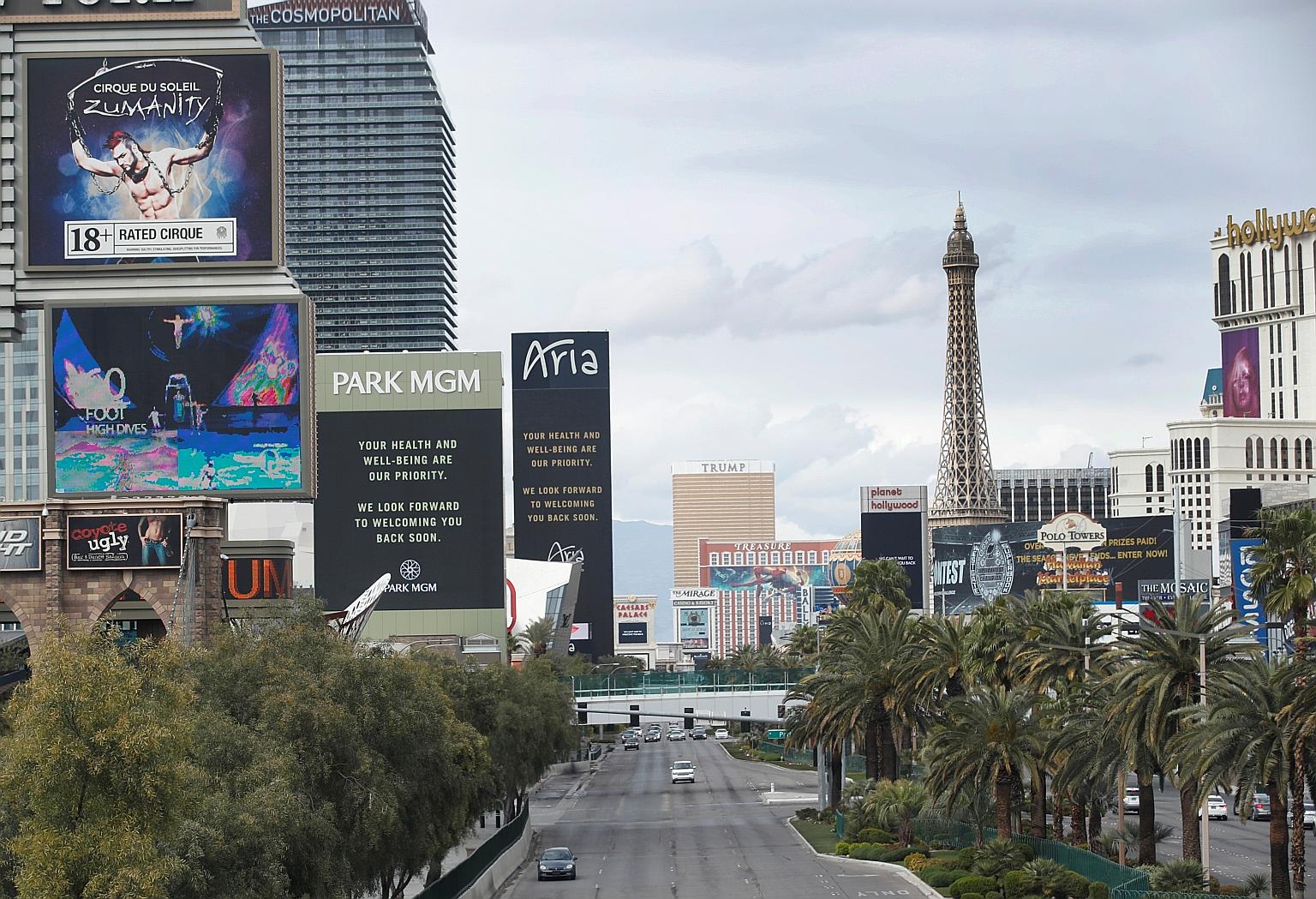Coronavirus pandemic
It's a 'Chinese virus', Trump insists as war of words deepens
State Department slams Chinese official's attempt to blame US military for outbreak
Sign up now: Get ST's newsletters delivered to your inbox

Messages put up by casinos on the Las Vegas Strip after all non-essential businesses in Nevada state, including casinos, were ordered to close in a bid to slow the spread of the coronavirus. President Donald Trump, when asked about his increasingly frequent use of the term "Chinese virus", said he did not think it was racist at all.
PHOTO: REUTERS
The war of words between China and the United States continues as President Donald Trump said there was nothing wrong in calling the coronavirus a "Chinese virus", stressing that it had originated in China.
Mr Trump's comment on Wednesday came as the State Department pushed back against Chinese Ministry of Foreign Affairs spokesman Zhao Lijian's attempt to attribute the pandemic to the American military, labelling it "irresponsible and unacceptable".
Asked at a daily media briefing on the Covid-19 crisis about his increasingly frequent and emphatic use of the term "Chinese virus", Mr Trump said he did not think it was racist at all.
"It comes from China, that is why," he said.
He added: "I have great love for all of the people from our country, but as you know, China tried to say at one point... that it was caused by American soldiers. That can't happen. It is not gonna happen, not as long as I am president. It comes from China."
A senior State Department official who spoke to journalists backed Mr Trump's assertion.
The Centres for Disease Control and Prevention had reached out to China very early on to offer help, he said. The World Health Organisation (WHO) had done so as well.
"By my calculation, it took a month for the WHO to actually be allowed into the country to investigate," he said.
"We have tried to cooperate when there was still an opportunity to resolve this before it became a global pandemic," he added.
"So, we did offer up US$100 million (S$145 million) for China and globally for dealing with this thing.
"We were able to use it in South-east Asia and other places. We did deliver 17.8 tonnes of equipment early on to Wuhan to help them, as we knew that they were having trouble with medical equipment and masks.
"About the language… the reason we want that to be out in the clear is so that not just China, but the world, can assess this, and then make plans and deal with it when it happens again."
On Tuesday, Beijing demanded that American journalists working for The New York Times, The Wall Street Journal and The Washington Post, whose credentials are due to expire before the end of this year, hand back their press cards within 10 days - in effect expelling them.
China cast the move as retaliation.
On Wednesday, the Chinese Ministry of Foreign Affairs said in a statement that "the US government has placed unwarranted restrictions on Chinese media agencies and personnel in the US, purposely made things difficult for their normal reporting assignments, and subjected them to growing discrimination and politically motivated oppression".
It noted that the US had told Chinese media organisations in the country to register as "foreign agents", and last month designated five Chinese media entities in the US as "foreign missions".
That led to a cap on the number of employees at these organisations, in effect expelling Chinese journalists from the US.
"Such outrageous treatment prompted strong representations from China, in which China firmly objected to and strongly condemned the US move, and stressed its reserved right to respond and take action," the ministry said.
In Washington on Wednesday, the senior official told reporters that China's accusations of oppression of journalists from the Chinese media were "fantastic and fictional".
"Anybody who has lived in China, either in the media or as a diplomat, knows that you are treated far differently in the PRC than you are here as far as openness, access and all the rest," the senior official said.
"Our response has been… looking to build some reciprocity in this relationship.
"We asked their media that are sponsored by the Chinese Communist Party (to) acknowledge that through determining that they were foreign missions.
"It is a strategic competition, therefore we treat each other the same. Because we are resisting in the media space and the economic space, they are having a much more difficult time advancing their interests."
Both countries and their governments feel vulnerable, said Ms Yun Sun, senior fellow and co-director of the East Asia Programme and director of the China Programme at the Stimson Centre in Washington.
"The crisis is affecting the US economy and Trump's re-election campaign," she said.
"China is afraid of becoming the 'enemy of the globe' for being the source of the virus. Both governments are trying to shed responsibility and blame it on each other.
"But China is definitely more forceful," she said.
"Now China has the virus under control at home for the time being, it has the free hands to come (up) with more offensives, such as the... expulsion of US reporters."


